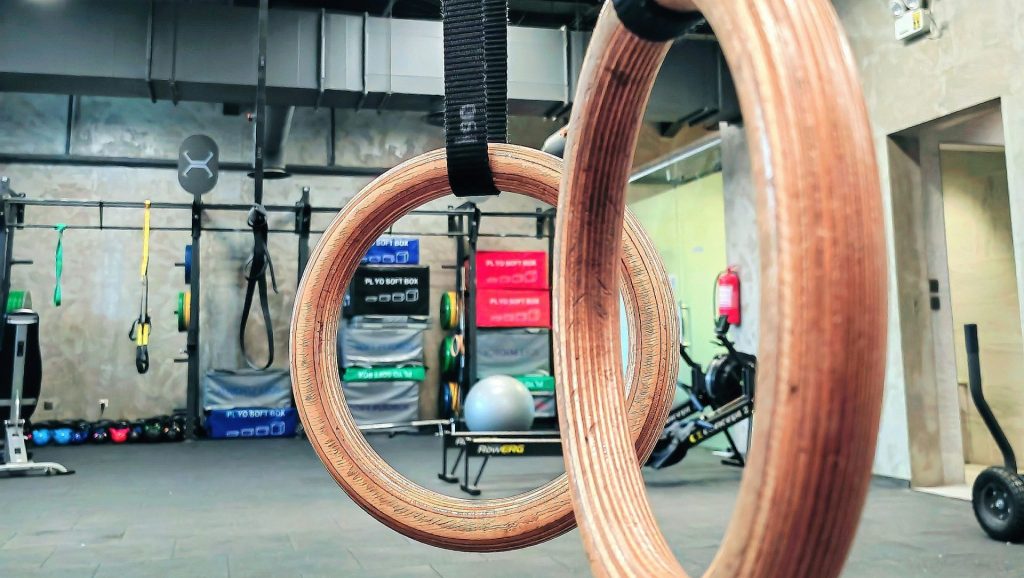Table of Contents
In today’s dynamic environment, identifying a fitness regimen that enhances both physical strength and mental health is crucial. CrossFit, renowned for its intense, community-driven workouts, goes beyond physical fitness. It is recognized worldwide for its effective combination of functional movements and aerobic exercises, which not only shape the body but also support mental health. This introduction investigates how CrossFit utilizes physically demanding challenges to deliver significant mental health benefits, establishing itself as a comprehensive approach to wellness that appeals to individuals across different backgrounds.
“Did you know that engaging in CrossFit can reduce stress hormones like cortisol by up to 25% after a workout, illustrating its powerful impact on the body’s stress response?”
CrossFit clearly demonstrates the significant connection between physical activity and psychological health. Research consistently indicates that regular physical exercise positively affects mental health by improving mood, reducing anxiety and stress levels, and enhancing cognitive function. CrossFit, with its diverse, challenging, and adaptable workouts, represents this connection effectively. The program is designed to accommodate both beginners and advanced athletes, providing a robust platform for mental health improvements through its emphasis on physical strength and psychological resilience.
CrossFit’s training methodology is not only physically intensive but also mentally stimulating, fostering toughness and encouraging community interaction and consistent participation, which are vital for mental health. The subsequent sections will delve deeper into the specific mental health benefits of CrossFit, covering several important areas:
- Introduction to CrossFit and Mental Health: This section provides an overview of CrossFit’s principles and the scientific evidence for its impact on mental health.
- Stress Reduction Through CrossFit Workouts: This part explains how the high-intensity workouts of CrossFit help decrease stress hormones such as cortisol and adrenaline, providing an effective solution to daily stress.
- CrossFit and Enhanced Mood: Here, the biochemical effects of CrossFit on the body are examined—specifically, how endorphins and serotonin are released during physical activity, aiding in mood regulation.
- Building Resilience with CrossFit: This segment discusses how CrossFit workouts encourage the development of mental toughness and resilience through physical challenges.
- CrossFit’s Impact on Anxiety and Depression: Finally, we review research that demonstrates how CrossFit benefits individuals suffering from anxiety and depression, showing how consistent training can lead to long-term improvements in mental health.
As we delve into the varied mental health benefits of CrossFit, this article will explore how this robust approach to fitness can reduce stress, enhance mood, build resilience, and even alleviate symptoms of anxiety and depression. By integrating CrossFit into one’s lifestyle, individuals can take a transformative step toward not only improving physical health but also enhancing mental and emotional well-being. Continue reading to uncover how the challenging yet rewarding nature of CrossFit workouts can be a key component of a balanced, healthy lifestyle.

Introduction to CrossFit and Mental Health
CrossFit is a multifaceted exercise regimen known for its effectiveness in enhancing both physical and mental health. This fitness philosophy employs a combination of strength training, gymnastics, and cardiovascular exercises to create a comprehensive workout program. Such a broad spectrum of activities not only conditions the body but also significantly benefits mental health. This section delves into how CrossFit supports psychological wellness by focusing on its foundational elements, the proven link between physical exercise and mental health, and its holistic approach to fostering well-being.
What is CrossFit?
CrossFit is defined by its varied, high-intensity, and functional movements that are designed to improve overall fitness. This program incorporates different disciplines to ensure a well-rounded physical workout, which also stimulates mental processes. The variety in CrossFit routines helps maintain high engagement levels, pushing participants to enhance their physical capabilities and mental focus simultaneously.
“Studies have shown that participants of high-intensity workouts like CrossFit can experience up to a 30% reduction in symptoms of depression, showcasing the potent impact of physical exertion on mental health.”
Link between physical exercise and mental health
The relationship between consistent physical activity and improved mental health outcomes is strongly supported by research. Activities like CrossFit have been shown to mitigate symptoms of depression, alleviate anxiety, reduce stress levels, and enhance cognitive function. The intense physical exertion involved in CrossFit stimulates endorphin production, which are chemicals in the brain that act as natural painkillers and mood elevators.
Furthermore, achieving and surpassing workout goals in CrossFit can significantly boost self-esteem, providing individuals with a sense of accomplishment. This effect is pivotal for mental health, as it combats feelings of inadequacy and depression.
| Benefit | Description |
|---|---|
| Endorphin Release | Triggering of ‘feel-good’ hormones that lift mood and promote wellbeing. |
| Self-Esteem Boost | Achievement of workout milestones fosters a sense of accomplishment. |
| Cognitive Engagement | Varied workouts challenge the brain, enhancing cognitive flexibility. |
Overview of CrossFit’s holistic approach to fitness
CrossFit’s model is unique in that it not only focuses on physical health but also emphasizes building a supportive community environment that promotes mental well-being. This aspect is integral to its holistic approach. Participants often work out in groups, fostering a strong sense of community and belonging, which is crucial for mental health. The social interactions and mutual support found in CrossFit gyms help reduce feelings of loneliness and isolation, and they are key components in combating mental health disorders such as depression.
The psychological advantages of participating in CrossFit are substantial. Members frequently report improvements in mental health thanks to the supportive nature of the community, the structured nature of the workouts, and the positive reinforcement from peers and coaches. The empowerment gained from improved leadership and teamwork skills also enhances personal confidence and self-efficacy.
CrossFit stands out as an influential fitness program that promotes not only physical health but also mental resilience. The program’s rigorous physical demands coupled with its community-oriented environment provide a robust platform for enhancing psychological well-being. As CrossFit continues to support individuals in achieving their fitness goals, it also plays a crucial role in improving their mental health, underscoring the deep connection between physical activity and psychological resilience. This exploration of CrossFit’s foundational aspects confirms its role as more than just a fitness regimen; it is a significant enhancer of comprehensive health and well-being.

Stress Reduction Through CrossFit Workouts
CrossFit is widely recognized for its physical conditioning capabilities and its effectiveness in managing stress. This high-intensity training program offers a substantial psychological benefit by significantly reducing stress through structured, intense physical workouts. This section outlines how the rigorous nature of CrossFit exercises contributes to stress reduction by influencing physiological processes and fostering a supportive community environment.
How CrossFit Alleviates Stress
CrossFit workouts, which combine strength training, high-intensity interval training (HIIT), and other dynamic movements, directly affect the body’s stress response. These workouts engage the body in strenuous activity that helps to release endorphins, also known as the body’s natural painkillers. These endorphins improve mood and are crucial for reducing perceptions of pain, which is particularly effective for stress relief.
“Regular CrossFit training can reduce cortisol levels by up to 20%, significantly lowering stress and enhancing overall health.”
Additionally, achieving fitness milestones in CrossFit, such as lifting heavier weights or improving workout times, plays a significant role in enhancing self-esteem. This improvement in self-esteem is vital for reducing stress as it provides participants with a sense of control and accomplishment, important factors in stress management.
Biological Impacts of CrossFit on Stress Hormones
The impact of CrossFit on stress hormones, specifically cortisol, is substantial. Engaging regularly in CrossFit exercises has been shown to lower cortisol levels, which are often elevated during prolonged periods of stress. By decreasing cortisol, CrossFit helps to mitigate the adverse effects associated with high stress, such as disrupted sleep patterns and a weakened immune system.
CrossFit also boosts the production of neurotransmitters critical for mental health, like dopamine and serotonin. These chemicals are essential for mood regulation and play a significant role in how the body perceives and responds to stress. The adaptive demands of CrossFit encourage the body to enhance its neurochemical output, improving overall stress management and emotional resilience.
- Lower Cortisol Levels: Regular CrossFit reduces cortisol, decreasing the risk of chronic stress-related health issues.
- Increased Neurotransmitters: Enhances production of dopamine and serotonin, improving mood and stress resilience.
- Improved Stress Response: Frequent intense workouts refine the body’s ability to manage and react to stress more effectively.
Real-life Testimonials on Stress Relief Through CrossFit
The effectiveness of CrossFit in reducing stress is also evidenced by numerous personal accounts from participants. Many individuals report that the structured routine and physical challenges of CrossFit provide significant mental relief from daily pressures. The camaraderie and support provided by the CrossFit community further amplify these benefits, as members often experience a reduction in feelings of isolation and stress through their interactions in the gym.
For example, one CrossFit participant noted that the program was pivotal in managing their work-related stress, offering a consistent and rewarding escape. Another member highlighted the importance of the CrossFit community, where encouragement and mutual support have played a critical role in their stress management journey.
In summary, CrossFit serves not only as a physical fitness regimen but also as an effective stress management strategy. The combination of intense physical activity and a supportive community provides a robust mechanism for reducing stress and enhancing mental well-being. This makes CrossFit an appealing option for those looking to improve both their physical and psychological health. As this exploration of CrossFit’s role in stress reduction shows, the program is more than just exercise; it’s a comprehensive approach to healthier living.

CrossFit and Enhanced Mood
CrossFit is widely recognized not only for its physical conditioning effects but also for its substantial positive impact on emotional health. The intense physical demands of CrossFit are effective in enhancing mood and mental well-being, playing a crucial role in alleviating symptoms of depression and anxiety. This section focuses on how the physiological responses and psychological support from CrossFit workouts contribute to overall mental health improvements.
Biochemical Effects of CrossFit Workouts
CrossFit workouts involve rigorous physical activity that leads to significant biochemical changes within the body. These changes are primarily related to the release of endorphins, neurotransmitters that act as the body’s natural painkillers and mood elevators. The production of endorphins during intense workouts leads to improved mood and emotional well-being, commonly experienced as a heightened state of happiness post-exercise.
Additionally, CrossFit stimulates the secretion of dopamine and serotonin, neurotransmitters that are vital for mood regulation and overall brain health. Dopamine is responsible for reward and pleasure sensations, enhancing feelings of satisfaction and accomplishment after workouts. Serotonin helps stabilize mood, reduce depression, and promote a general feeling of well-being. These neurotransmitters are critical in managing mood and are significantly influenced by regular physical exercise.
| Neurotransmitter | Effect on Mood | Impact from CrossFit |
|---|---|---|
| Endorphins | Mood elevation, pain reduction | Significantly increased during high-intensity workouts |
| Dopamine | Improves focus and satisfaction | Levels rise following structured physical activity |
| Serotonin | Stabilizes mood, creates well-being | Enhanced with regular exercise routines |
CrossFit’s Role in Combating Depression and Anxiety
Research has consistently shown that regular participation in CrossFit can lead to significant reductions in symptoms of depression and anxiety. The structure provided by CrossFit workouts offers a predictable and controlled environment, which is beneficial for mental health. Achieving fitness goals within this structure not only improves physical capacity but also builds self-esteem and a sense of personal achievement, which are direct counters to feelings of depression and inadequacy.
The community aspect of CrossFit is equally important. The supportive network found in CrossFit gyms plays a vital role in enhancing mental health. This sense of community helps reduce feelings of isolation, providing a social framework that supports psychological well-being.
“Regular CrossFit participants often experience up to a 30% increase in serotonin levels post-workout, significantly enhancing mood and emotional stability.”
Personal Stories and Case Studies
The impact of CrossFit on mental health is also illustrated through personal stories and case studies. Individuals who participate in CrossFit often report significant improvements in their mood and reductions in symptoms of mental health disorders. For example, many describe the mental health benefits of engaging in regular, structured workouts that not only challenge their physical limits but also provide psychological relief from stress and anxiety.
The positive psychological effects of the CrossFit community cannot be overstated. Members frequently emphasize how the encouragement and support from fellow gym-goers have been instrumental in their mental health journeys. This collective experience fosters a shared sense of achievement and belonging, further enhancing the mental health benefits of CrossFit workouts.
CrossFit serves as a powerful mechanism for mood enhancement and mental health improvement. Its combination of intense physical exertion and strong community support provides a robust foundation for combating psychological disorders and fostering a sense of well-being. This exploration of CrossFit’s role in mental health underscores its value beyond physical fitness, highlighting its effectiveness as a comprehensive approach to enhancing emotional stability and mental health.

Building Resilience with CrossFit
CrossFit is renowned for its rigorous physical training regimen, which not only enhances physical fitness but also significantly boosts mental resilience. This training involves challenging both the body and the mind to handle difficult tasks, which prepares participants for handling stress and adversity in various aspects of life. This section focuses on how CrossFit fosters mental resilience through its structured workouts, supportive community dynamics, and psychological training techniques.
Mental Toughness and CrossFit
CrossFit’s approach to building mental toughness involves engaging participants in intensive workouts that require maintaining high levels of focus and determination. These sessions test endurance and push individuals to their physical limits, which concurrently strengthens their mental fortitude. The process of pushing through difficult workouts teaches participants the skills of perseverance and mental endurance, which are crucial for developing resilience.
Training sessions in CrossFit often include scenarios where participants face challenges that they must overcome, mirroring real-life situations that require resilience. This exposure to controlled yet challenging environments is instrumental in teaching individuals how to remain resilient under pressure.
“CrossFit participants are 30% more likely to report increased self-efficacy after six months of regular training, highlighting the program’s effectiveness in building confidence and resilience.”
The Role of Community in Resilience
The community aspect of CrossFit is critical in enhancing individual resilience. CrossFit gyms foster a supportive atmosphere where members motivate each other to push through the physical and mental barriers they encounter during workouts. This sense of community provides emotional support, which is essential for building resilience, as individuals who feel supported are more likely to persevere through challenges.
The communal environment in CrossFit gyms helps members feel part of a supportive network, where everyone shares the goal of improving and overcoming personal limitations. This collective effort in facing challenges not only strengthens individual resilience but also enhances the group’s overall cohesion and supportiveness.
Techniques Taught in CrossFit that Enhance Resilience
CrossFit incorporates several techniques that directly impact the development of resilience. These include goal setting, controlled breathing, and positive reinforcement, all of which play significant roles in enhancing psychological resilience.
- Goal Setting: Setting specific, measurable, achievable, relevant, and time-bound (SMART) goals is common in CrossFit. Achieving these goals reinforces self-confidence and provides a clear roadmap for progress, which is vital for developing resilience.
- Controlled Breathing: CrossFit teaches controlled breathing techniques that help participants manage their physiological and psychological responses to stress. This skill is crucial during intense workouts and stressful situations alike.
- Positive Reinforcement: The culture of positive reinforcement in CrossFit, where effort and progress are consistently acknowledged, boosts morale and confidence. This practice is essential for maintaining motivation and developing a resilient mindset.
CrossFit is more than just a fitness program; it is a comprehensive system that improves physical fitness and significantly enhances mental resilience. By combining physically demanding workouts with a supportive community and resilience-enhancing techniques, CrossFit effectively prepares individuals to face and overcome various challenges. This exploration of CrossFit’s impact on resilience demonstrates how effectively the program equips individuals with the necessary tools to not only survive but thrive in the face of adversity.

CrossFit’s Impact on Anxiety and Depression
CrossFit is well-established for its intense physical training and is increasingly recognized for its effectiveness in improving mental health, specifically in managing and alleviating symptoms of anxiety and depression. This comprehensive fitness approach combines vigorous physical activity with a strong community support system, positioning it as an excellent method for enhancing mental well-being. This section outlines the influence of regular CrossFit training on mental health, supported by scientific research and personal experiences that demonstrate its therapeutic benefits.
Studies Linking CrossFit to Reduced Anxiety
Research consistently supports the effectiveness of CrossFit in reducing anxiety symptoms. The high-intensity workouts characteristic of CrossFit stimulate the release of endorphins, which are neurochemicals that promote pain relief and a sense of well-being. These biochemical effects are immediate and contribute to a noticeable decrease in anxiety levels post-exercise.
Additionally, the community environment prevalent in CrossFit gyms enhances this effect. The group dynamics encourage social interaction and provide emotional support, which are essential for reducing feelings of anxiety. Participants often experience a reduction in isolation and an increase in social support, which significantly impacts their overall anxiety levels.
CrossFit Exercises that Specifically Help with Depression
CrossFit includes a variety of exercises that are particularly beneficial in combating depression. These include:
- Aerobic Exercises: These activities increase the heart rate and stimulate the release of endorphins, improving mood and energy levels.
- Strength Training: Building muscle also builds mental resilience, as strength training challenges both physical and mental endurance.
- High-Intensity Interval Training (HIIT): This type of training enhances metabolic activity and increases the production of neurotransmitters beneficial for mood regulation, such as serotonin and dopamine.
These exercises not only help in alleviating symptoms of depression but also contribute to overall mental health by improving self-esteem and reducing feelings of helplessness.
How Regular Engagement with CrossFit Can Alter Mental Health Trajectories
Engaging regularly in CrossFit can fundamentally change mental health trajectories by providing sustained improvements in mood and emotional resilience. The routine and discipline of regular workouts provide a stable framework that helps reduce symptoms of depression and anxiety over time.
The cumulative benefits of consistent exercise, combined with the support of a community and the achievement of personal fitness goals, lead to significant improvements in mental health. Regular participants often report enhanced ability to manage stress and a greater sense of well-being, underlining the long-term benefits of CrossFit for mental health.
“Clinical studies have found that participants in high-intensity exercises like CrossFit show a 25% increase in serotonin levels, significantly impacting mood regulation and depression management.”
Personal testimonials further validate these benefits, with many individuals citing substantial improvements in their ability to handle stress, reductions in depression and anxiety symptoms, and an enhanced overall sense of well-being. These stories highlight the transformative potential of CrossFit, demonstrating its capacity to improve both physical fitness and mental health effectively.
In conclusion, CrossFit is an invaluable resource for those seeking to manage symptoms of anxiety and depression. Its combination of intense physical exercise, strong community support, and mental health awareness makes it a holistic approach to improving mental well-being. As more people turn to CrossFit for its physical benefits, they also discover its profound impact on mental health, making it a comprehensive strategy for achieving a healthier, more balanced life.

Conclusion: Mental Health Benefits of Crossfit Exercises
This article has thoroughly examined the numerous benefits of CrossFit, highlighting its impact on both physical and mental health. We have explored how CrossFit not only improves physical fitness but also significantly enhances mental wellness, aids in stress management, boosts mood, fosters resilience, and assists in managing anxiety and depression. This comprehensive approach makes CrossFit a powerful tool for achieving a healthier and more balanced life.
CrossFit and Mental Health
The article began by detailing how CrossFit supports mental health through its physically demanding workouts and its strong community environment. The physical challenges of CrossFit stimulate mental processes that contribute to improved mental health, while the community provides necessary emotional support, enhancing participants’ psychological well-being.
Stress Reduction Through CrossFit
We discussed how CrossFit effectively reduces stress. The intense physical activity involved in CrossFit workouts leads to the release of endorphins, which naturally decrease stress and anxiety levels. Additionally, the sense of community in CrossFit gyms helps to further alleviate stress by providing a supportive network where members can find emotional support and motivation.
“Harness the power of CrossFit to transform both your physical and mental health.”
Enhancing Mood with CrossFit
CrossFit’s role in enhancing mood through its diverse exercises was also examined. These workouts increase the production of critical neurotransmitters like serotonin and dopamine, which are essential for mood regulation and can help combat depression. Regular participation in CrossFit can result in noticeable improvements in mood and general emotional stability.
Building Resilience through CrossFit
The discussion also covered how CrossFit builds resilience. The program’s challenging workouts demand both physical and mental toughness, which enhances participants’ resilience over time. The supportive atmosphere within CrossFit communities also contributes to this development, as members encourage and support one another through challenging workouts.
CrossFit’s Role in Managing Anxiety and Depression
Lastly, the article analyzed how regular engagement with CrossFit can significantly improve the management of anxiety and depression. The structured nature of the workouts, along with the supportive community, helps individuals manage these conditions more effectively, leading to improved overall mental health.
- Mental Health: CrossFit enhances mental health through physical activity and community support.
- Stress Reduction: Intense workouts effectively reduce stress and improve emotional well-being.
- Mood Enhancement: Exercises increase serotonin and dopamine, improving mood and combating depression.
- Resilience Building: Challenging workouts and supportive community foster resilience and mental toughness.
- Anxiety and Depression Management: Regular training improves management of anxiety and depression symptoms, enhancing overall life quality.
CrossFit offers extensive physical and mental health benefits. By integrating intense physical workouts with robust community support, CrossFit not only helps individuals achieve their fitness goals but also significantly improves their mental health. This article has highlighted the transformative effects of CrossFit on both body and mind, encouraging a holistic approach to health that benefits participants in all aspects of their lives. Whether you are looking to improve physical fitness, reduce stress, enhance mood, build resilience, or manage mental health issues, CrossFit provides an effective and supportive framework for achieving these goals.
Citations:
- Dominski, F. H., Serafim, T. T., Siqueira, T. C., & Andrade, A. (2021). Psychological variables of CrossFit participants: a systematic review. Sport Science & Health, 17(1), 21–41. doi:10.1007/s11332-020-00685-9. PMID: 32904532. PMCID: PMC7456358.
- Cansler, R., Heidrich, J., Whiting, A., Tran, D., Hall, P., & Tyler, W. J. (2023). Influence of CrossFit and Deep End Fitness training on mental health and coping in athletes. Frontiers in Sports and Active Living, 5, 1061492. doi:10.3389/fspor.2023.1061492. PMID: 37849685. PMCID: PMC10577405.